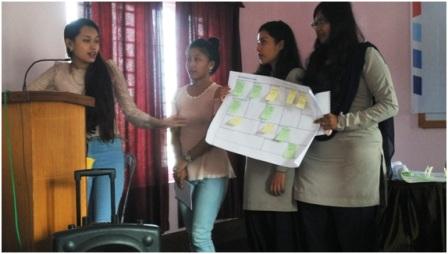Social entrepreneurship conference with management students

King's College has always been motivating its students in transferring such knowledge. With the concept of decentralization, we reach out to the business college out of Kathmandu valley, Dharan. With the positive response from Dharan College of Management, a team of 3 facilitators left to Dhran from King's College. As Social Enterprise has become one of the trending topic, these kind of seminars would be helpful to business students. Despite of ongoing strikes and obstacles, the event went successful with the participation of 57 students.
Event Details
The event was scheduled to be started exactly at 12:00 noon. With a short conversation with college representatives, the sitting arrangement was to be changed and therefore the event was started with the delay of 15 minutes. The program was planned into 3 sessions
The event started with the welcome note from respected Principal sir of Dharan College of Management. Started with the short introduction of facilitators, Mr. Nanda Kishor Mandal, lead facilitator started with ice breaking session. The task was given to a participant to introduce another participant sitting next him or her in the hall. Slowly and gradually, students started reacting with each other and with the facilitators in the hall. When almost all students were interacting, the content of the seminar was detailed.
The Topics discussed in the workshop comprised of the below mentioned components which makes a complete Social Business Model Canvas
Slowly and gradually, students were getting information about the ways the advertisement are done as per the customer segment. Participants were made understand about the value of knowing of customer segment at first. Then the problems were to be identified that the customer segment is facing in general. The importance of value proposition was detailed in this session. In the next session, Mr. Mandal explained, was about the importance of customer channel and relationship between customers and the enterprise. The seminar was made more interactive with frequent questions to and from participants. The hall was participating and the knowledge was being shared.
When all twelve components of Social Business Canvas were explained, the training session was coming to an end. The participants were refreshed with lunch and networking with the facilitators for about 20 minutes.
Now participants were asked to plan their own business based on the knowledge they got in last three hours by identifying one major challenges they are facing and what could be the potential solution to it. The participants were asked to plan the solutions offered as a business activity and the ways to monetize it.
As of the starting of seminar, Mr. Mandal again introduced participants with an activity. This time, all participants were provided with multiple colored balloons. The participants were asked to blow the balloon. After almost all participants were done with blowing their balloon, they were asked to team up with others having the same colored balloons. In this way, five teams were formed. Now the teams were asked to think about their prefered customer segment, analyse the possible problems they are facing, the solution of the problem, how the solutions are to be achieved and so on. All the plannings were done with the help of copy, pen, sticky notes, and Social Business Canvas. Participants were given an hour of time to present their idea. And at the end of this session, all groups were asked to present their ideas. In the meantime, facilitators were engaged with participants and supported participants to completion of the canvas.
The concept was transferred to the business students when the delivery was based on examples. Students grabbed the concept and were able to present 5 different ideas based on social enterprise.
Feedback from Participants
The success of the event was reflected from the positive feedback from the participants of the seminar. Few of them were expecting more time for such sessions. With the proper management of the workshop space, we could have organized more effective program.
Feedback from the Principal
The principal of Dharan College of Management expressed his happiness. He was happy to feel the impact to his students due to the seminar program organized. He is also looking forward to collaborate with us in the near future for similar events. With the involvement of three faculty members including Principal sir and three facilitator from King’s College the event was concluded successfully.
Word of Thanks
We would like to express our gratitude to BP Koirala India Nepal Foundation, Administration of Dharan College of Management and to all participants to make the event a success. With the collaborative approach, we would certainly like to work and have an impactful events in the future.